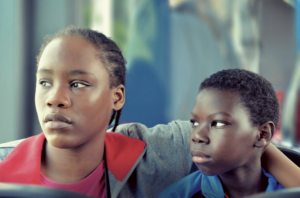
Joely Mbundu and Pablo Schils as Lokita and Tori (Courtesy Les Films du Fleuve)
Jean-Pierre and Luc Dardenne, Belgian documentarians and filmmakers, have an astonishing number of Cannes wins in their filmography: seven of their twelve films won awards in various categories at the festival over the years, including two Palme d’Ors (for Rosetta, 1999, and The Child, 2005), the only Belgian films to receive that honor so far. Their latest feature film, Tori and Lokita (2022), won the 75th Anniversary prize at Cannes.
I have been delighted to find that the corporate movie theater in what my kids and I call “the rich person mall” shows loads of independent films and is one of the screening sites for the St. Louis International Film Festival. A friend with good taste in films told me Tori was showing there, so I went to check it out.
The theater—surrounded by storefronts for Louis Vuitton, Saks, Neiman Marcus, and Tiffany’s, and with a Bentley sedan sitting in the middle of the mall floor, in that new shade of gray that is warmer than the old gunmetal gray—seemed to offer an extra layer of meaning.
Tori after all is about two African refugees: Lokita, a girl of 16, and Tori, a boy of 11, who have been smuggled into Belgium to work. Everyone who offers them help is corrupt and cynical, from the vicious head of the church who apparently brought them there, to the cook/drug dealer who employs them as couriers, to the criminal pot farmers who also put the girl to work, locked in Conex containers. The social workers assigned to their cases seem unable to help, and the emotion of the film comes from the sustaining love between the two main characters, who claim they are brother and sister despite problems in that story.
The film has an integrity of vision. Its pacing is unlike any blockbuster, so we are allowed to follow characters down the street at a human pace, and listen to them perform, by demand, the entirety of a special song they have memorized to the customers where they run drugs. The consequences to them of events beyond their control, due to choices made by other people, are realistic and heartbreaking.
In the press kit the Dardenne brothers say that only when they saw the core of the film as the friendship between the two characters did Tori and Lokita come alive as “unique human beings” and move “beyond the media-defined image of those young migrants known as ‘unaccompanied foreign minors,’ that they were becoming more than the mere illustration of a case, a situation, a theme or a subject.” Yes, the Dardennes add, “[U]nwittingly, our film has also become a denunciation of the violent and unjust situation experienced by these young people in exile in our country, in Europe.”
The directors also chose not to use professional actors for their leads, and no one widely recognizable in other roles, in order not to “give the audience incorrect expectations of the plot”—that is, to expect, say, a happy ending because a celebrity was attached.
Even in lighting and locations, “Our concern…was not to mummify or freeze things, but to let the wind blow suddenly, without warning, and to let the movements of the friendship between Tori and Lokita appear, as if by surprise, as if coming to life before our eyes.”
I warned my friend I would hold her personally responsible if both Tori and Lokita died. While that does not happen, the film will break your heart, as it must; it is highly recommended as an antidote to corporate visions.
